Matt Micucci's Top 10 film from the 70th Venice Film Festival
NOTE: This top ten, more or less in order of personal preference, is only of the films that I have seen and does not include the ones I have not seen. As well as that, it only includes the films that were part of the official programme of the festival and its different selections - main competition, Orizzonti, Venice Days, Settimana della Critica, Venice Film Market, special screenings and out of competition screenings. Hence, it does not include the Lux Prize finalists. Although these three films were screened during the festival, they were not actually part of the official programme and were treated as a different and independent section.
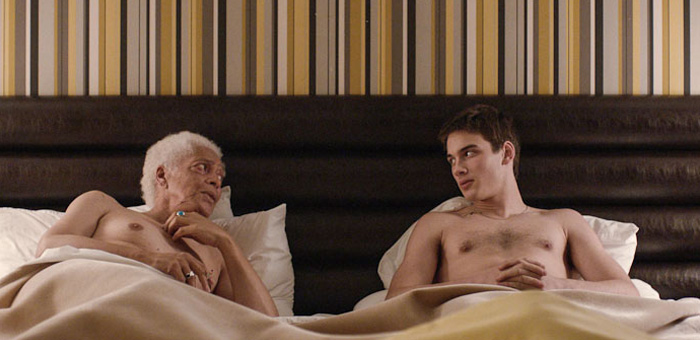
10. - GERONTOPHILIA by Bruce la Bruce
An 18-year-old discovers his sexual fetishism for old men after he falls in love with an 81-year-old inhabitant of the nursing home he works in. Bruce la Bruce returns with another controversial. Yet this time he ditches - perhaps momentarily - his visual explicitness and usual tastelesness for a more classicist and romantic approach in quite a remarkable way. With production values upped and a more complex narrative, Gerontophilia not only shows that Bruce la Bruce could perhaps re-invent himself as a more mainstream kind of non-conformist filmmaker, but also represents his audacity at creating a film which audaciously represents a kind of remarkable artistic rebirth.
WATCH THIS IF YOU LIKED - Hustler White (1996, Bruce la Bruce), Harold and Maude (1971, Hal Ashby)
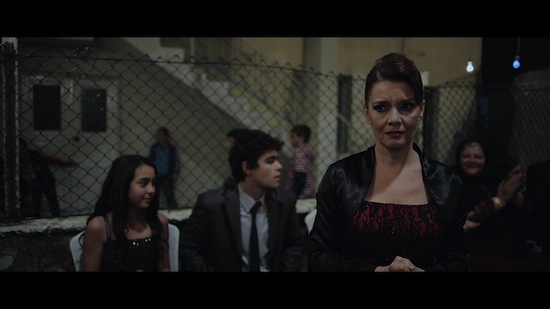 9. - NOBODY'S HOME by Deniz Akcay
9. - NOBODY'S HOME by Deniz Akcay
The story of a selfish and depressed mother, her caring adult daughter who longs for her own independence, her estranged and rebellious son and her neglected youngest daughter. They are four people who not only struggle to feel like a family after the death of their husband and father but also slowly but surely seem to be on the road to destroying each other’s lives. Deniz Akcay’s Nobody’s Home is a remarkable first feature that brims of emotional pathos in an oppressive urban background. However, the most interesting aspect of the film is that apart from its heart-breaking domestic drama, it feels like a fresh landmark for Turkish cinema in its representation of female characters and situations that go beyond the traditional conservative ways.
WATCH THIS FILM IF YOU LIKED - A Separation (Jodaeiye Nader az Simin, 2011, Asghar Farhadi), Head On (Gegen die Wand, 2004, Fatih Akin)
 8. - LENNY COOKE by Bennie Safdie, Joshua Safdie
8. - LENNY COOKE by Bennie Safdie, Joshua Safdie
The rise and immediate fall of promising young basketball star Lenny Cooke as he gears up for the 2001 NBA Draft but fails on the grounds of meritocracy. We meet him years later, as he inevitably reflects on his mistakes in letting himself miss the opportunity and waste his natural talent. This film was screened as a special exchange between the Venice Film Festival and the Tribeca Film Festival. It is a very gritty feel with a beautiful feel of urban decadence. The stock footage looks dirty and raw, making it seem more legitimate. The Safdie brothers are very reminiscent of the other legendary brothers in documentary, the Meysels. In Lenny Cooke, in fact, they employ the same guerrilla tactics of direct cinema and let the characters speak for themselves and seduce the camera. Ultimately, however, out of the natural comedy of the world which they film comes an honest tragedy of fate and Shakespearean remorse right up to epilogue, which is at once dramatic and poetic.
WATCH THIS FILM IS YOU LIKED - Salesmen (1968, Albert Maysels, David Maysels, Charlotte Zwerin), Hoop Dreams (1994, Steve James)
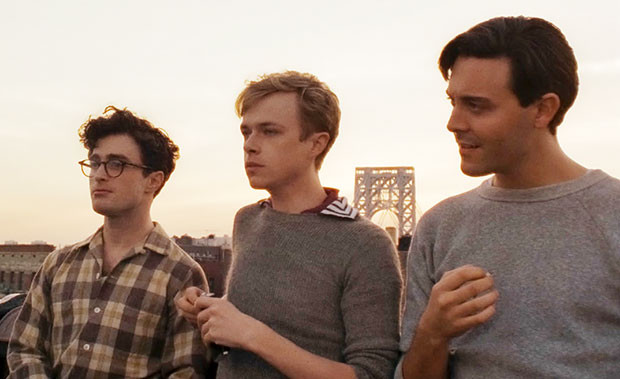 7. - KILL YOUR DARLINGS by John Krokidas
7. - KILL YOUR DARLINGS by John Krokidas
The story of the meeting between a Columbia University student called Allen Ginsberg with two other beat literary icons to be – Jack Kerouac and John Burroughs. The meeting takes place around the figure of Lucien, a suave rebellious figure who seems to inspire the three yet also often place them in dangerous situations. Krodikas, in his first feature, revives the spirit of the beat writers by giving himself little time to complete the film, and even the slight imperfections in the cinematography recall the missing punctuations in a sentence by Kerouac. Kill Your Darlings has a very modern feel and is suitably directed at a younger audience through a good use of and edgy style, a sexual charge and even by incorporating modern music in the soundtrack. Furthermore, the aimed casting of Daniel Radcliffe as Ginsberg proves to be suited and his performance quite brave. While many will argue whether Krokidas went too far in making the beat culture look contemporary, there is no doubt about the fact that Kill Your Darlings is an appealing and fashionable take on the times as well as a harrowing look at the harrowing pain behind the greatest of artists.
WATCH THIS FILM IF YOU LIKED - The Great Gatsby (2013, Baz Luhrmann), The Breakfast Club (1985, John Hughes), If.... (1968, Lindsey Anderson)
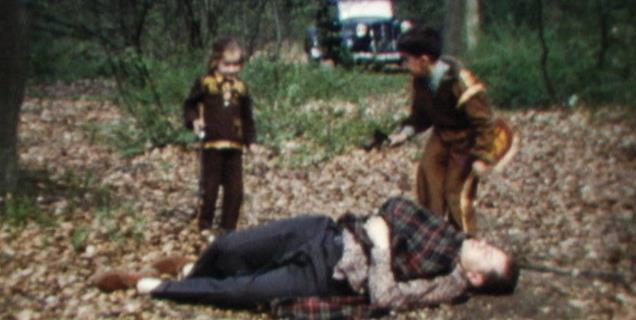 6. - REDEMPTION by Miguel Gomes
6. - REDEMPTION by Miguel Gomes
Four men in different time and place settings recall different stages in their lives and an event which deeply affected them. A genial mix of experimental essay documentary filmmaking and cleverly creative political satire. Miguel Gomes plays with the viewer’s perception of the archive imagery and the deep and sentimental voiceovers to imagine some plausible event that would have shaped the lives of four important politicians and made them what they ultimately become. In this way, he thematically recalls what we could call the ‘rosebud’ element from Welles’ Citizen Kane. In this sense, it also works as the recreation of an imaginative re-invention of the term ‘public figure’ in its most open definition.
WATCH THIS FILM IF YOU LIKED - La Morte Rouge (2006, Victor Erice), Sans Soleil (1983, Chris Marker)
 5. - WALESA. MAN OF HOPE by Andrzej Wajda
5. - WALESA. MAN OF HOPE by Andrzej Wajda
Legendary Polish filmmaker Wajda returns to shed new light on another important moment in Polish history and completes his trilogy; after the Man of Marble and the Man of Iron, here is the Man of Hope. This time, his subject is Lech Walesa, an electrician who was responsible for founding the first independent trade union in the Soviet bloc. And this time, his subject is still and alive and kicking important figure in Polish modern history. For Wajda, this is the return of his somewhat recognisable style of classics such as Man of Marble for which he also used archive footage, a mixture of black and white photography with colour photography and a steady pace. The visual style is quite remarkable particularly when considering that this film did not have a big budget. Through its sometimes poignant sense of humour and use of irony in the portrayal it is also delightfully satirical and deserves added points for entertainment. Perhaps it is not as passionate as his best work, but like a lot of his works he has that matter-of-fact consistency from which a genuine desire for unearthing the Polish conscience can be drawn. Wajda himself announced a while back that his biopic on Walesa might have ended up controversial, however it never feels like it is, but it rather feels like the solid and confident work of an experienced filmmaker. It wouldn’t be fair not to mention Robert Wieckiewicz’s excellent performance as the titular historic figure.
WATCH THIS FILM IF YOU LIKED - Man of Marble (Czlowiek z marmuru, 1977, Andrzej Wajda), The Iron Lady (2011, Phyllida Lloyd)
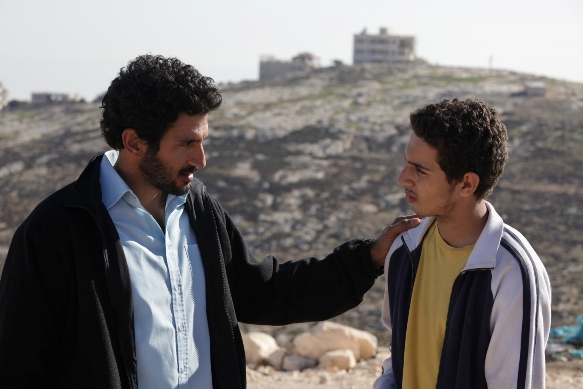 4. - BETHLEHEM by Yuval Adler
4. - BETHLEHEM by Yuval Adler
The Israeli Palestinian conflict is always a hot and controversial topic to be dealing with. Yuval’s choice of dealing with it for his first film reveals him as quite ambitious and audacious. Bethlehem is the story of three men who are caught in the middle of the storm; a man from the Israeli Secret Service, a leader of the Palestinian militants and an informant who is emotionally attached to both sides by friendship and family. Adler’s film is a powerful spy thriller, yet it has nothing to do with the conventional perception of the genre, particularly in its realistic approach that refuses to sugarcoat the cultural context of the story. Betlehem is also admirable for its refusal to pick sides or make major political statements choosing instead to focus on the emotional side of the story and the intensity of the characters as individuals. While some may still find the inevitable political implications a little uneasy, Bethlehem is a remarkably powerful work.
WATCH THIS FILM IF YOU LIKED - Bloody Sunday (2002, Paul Greengrass), The Hurt Locker (2008, Kathryn Bigelow)
 3. - THE ARMSTRONG LIE by Alex Gibney
3. - THE ARMSTRONG LIE by Alex Gibney
The investigative documentarian par excellence of this generation, Alex Gibney, returns shortly after the release of his fearless The Story of WikiLeaks and Mea Maxima Culpa with another gripping and exciting documentary that retains the urgency of unfolding history. Here, the subject of his documentary is Lance Armstrong, the seven times Tour de France winner who was caught for doping, thus tainting his legacy as sports icon. The interesting aspect is that in 2009, Armstrong’s return to the Tour the France after his retirement would have been the subject of another Gibney documentary which would have looked at him in a totally different perspective. This adds a personal element to the film which makes it a little more personal and hence interesting whilst never taking over the mystery of the plot as it unravels at an exciting pace. Gripping and entertaining, this film is also an interesting behind the scene to a sport tainted renowned for being repeatedly tainted by doping scandals whilst being accessible to an audience that wouldn’t be very familiar with the sport. In short, it seems that Alex Gibney is a trend setter and there is no one better, at least in cinema nowadays, in making the kind of films that he makes and in making them with such an amazing consistency.
WATCH THIS FILM IF YOU LIKED - We Steal Secrets: The Story of WikiLeaks (2013, Alex Gibney), The Imposter (2012, Bart Layton)
 2. - PHILOMENA by Stephen Frears
2. - PHILOMENA by Stephen Frears
A down and out reporter comes across an Irish woman named Philomena whose son, who would now be fifty, was taken away from her by the Magdalene Sisters. He decides to write an article about her as he helps her trying to find him. The screenplay, based on a true story, is solid gold, with its perfectly timed balance of humour and drama. Furthermore, despite the fact that it deals with the heavy issue of a Catholic Church scandal, it also remains quite balanced in dealing with it from the two different perspectives of the lead characters on faith and spiritualism in general. The acing is masterful. Judi Dench stars as the titular character with a performance that is full of sensibility and humanity – it is arguably her best performance of all time, sweetly melancholic and humorous. Steve Coogan opposite her is the perfect disenchanted cynic – he also deserves praise for co-writing the screenplay and producing the film. All in all, Frears’ film is a crowd pleaser but one full of meaning and purpose which aims to achieve the prose that most of its kind fail to accomplish and is successful at doing just that.
WATCH THIS FILM IF YOU LIKED - The King's Speech (2010, Tom Hooper), Mrs. Henderson Presents (2005, Stephen Frears)
 1. - STRAY DOGS by Tsai Ling-Miang
1. - STRAY DOGS by Tsai Ling-Miang
The portrait of a family in Taiwan that lives in a certain state of decadence. This film will split the audience in half. While some will never stop praising it, others will quite simply have no time for it. Its reliance on lengthy uneventful and still shots as well as a narrative that seems to go nowhere will frustrate many viewers. But then again, this film is not for everyone and that is part of its appeal. Tsai Ling-Miang moves at his own pace and doesn’t seem to be interested in shifting away from his still and challenging style. Stray Dogs is, whether people like it or not, a truly magnificent vision and a purifying experience. Very often as an audience we are used to the camera pointing at a subject only if that subject will do something or interact with an object in some way. Here, the opposite happens most of the time, and the audience is hence led to interact with the scenes and lack of action in a subconscious and unique way. Yet, the intensity of the lack of action is powerful in its own unique way. In a sense, with Stray Dogs in particular, Tsai Ling-Miang re-invents the cinematic language but the perception of its beauty and its emotion relies on the will of the viewer to tag along for the ride and be transported by this hypnotising and stunning film. Of course, Stray Dogs heavily hints at serious themes, like the decadence and frustration of modern culture, but on a human level it is just as intense.
WATCH THIS IF YOU LIKED - Vive l'Amour (Aiqing wansui, 1994, Tsai Ling-Miang), Stalker (1979, Andrei Tarkovsky)